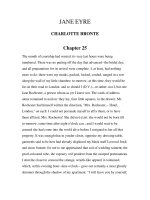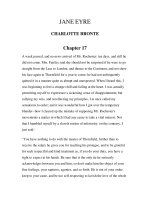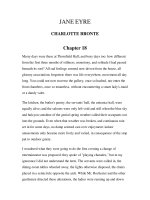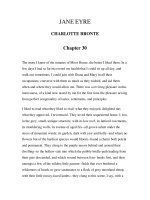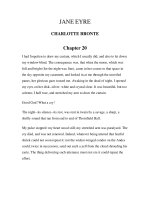Tài liệu LUYỆN ĐỌC TIẾNG ANH QUA TÁC PHẨM VĂN HỌC-Emma -Jane Austen Volume I Chapter V ‘ doc
Bạn đang xem bản rút gọn của tài liệu. Xem và tải ngay bản đầy đủ của tài liệu tại đây (24.38 KB, 9 trang )
Emma
Jane Austen
Volume I
Chapter V
‘I do not know what your opinion may be, Mrs. Weston,’ said Mr.
Knightley, ‘of this great intimacy between Emma and Harriet Smith, but I
think it a bad thing.’
‘A bad thing! Do you really think it a bad thing?— why so?’
‘I think they will neither of them do the other any good.’
‘You surprize me! Emma must do Harriet good: and by supplying her with a
new object of interest, Harriet may be said to do Emma good. I have been
seeing their intimacy with the greatest pleasure. How very differently we
feel!—Not think they will do each other any good! This will certainly be the
beginning of one of our quarrels about Emma, Mr. Knightley.’
‘Perhaps you think I am come on purpose to quarrel with you, knowing
Weston to be out, and that you must still fight your own battle.’
‘Mr. Weston would undoubtedly support me, if he were here, for he thinks
exactly as I do on the subject. We were speaking of it only yesterday, and
agreeing how fortunate it was for Emma, that there should be such a girl in
Highbury for her to associate with. Mr. Knightley, I shall not allow you to be
a fair judge in this case. You are so much used to live alone, that you do not
know the value of a companion; and, perhaps no man can be a good judge of
the comfort a woman feels in the society of one of her own sex, after being
used to it all her life. I can imagine your objection to Harriet Smith. She is
not the superior young woman which Emma’s friend ought to be. But on the
other hand, as Emma wants to see her better informed, it will be an
inducement to her to read more herself. They will read together. She means
it, I know.’
‘Emma has been meaning to read more ever since she was twelve years old.
I have seen a great many lists of her drawing-up at various times of books
that she meant to read regularly through—and very good lists they were—
very well chosen, and very neatly arranged—sometimes alphabetically, and
sometimes by some other rule. The list she drew up when only fourteen—I
remember thinking it did her judgment so much credit, that I preserved it
some time; and I dare say she may have made out a very good list now. But I
have done with expecting any course of steady reading from Emma. She will
never submit to any thing requiring industry and patience, and a subjection
of the fancy to the understanding. Where Miss Taylor failed to stimulate, I
may safely affirm that Harriet Smith will do nothing.— You never could
persuade her to read half so much as you wished.—You know you could
not.’
‘I dare say,’ replied Mrs. Weston, smiling, ‘that I thought so then;—but
since we have parted, I can never remember Emma’s omitting to do any
thing I wished.’
‘There is hardly any desiring to refresh such a memory as that,’—said Mr.
Knightley, feelingly; and for a moment or two he had done. ‘But I,’ he soon
added, ‘who have had no such charm thrown over my senses, must still see,
hear, and remember. Emma is spoiled by being the cleverest of her family.
At ten years old, she had the misfortune of being able to answer questions
which puzzled her sister at seventeen. She was always quick and assured:
Isabella slow and diffident. And ever since she was twelve, Emma has been
mistress of the house and of you all. In her mother she lost the only person
able to cope with her. She inherits her mother’s talents, and must have been
under subjection to her.’
‘I should have been sorry, Mr. Knightley, to be dependent on your
recommendation, had I quitted Mr. Woodhouse’s family and wanted another
situation; I do not think you would have spoken a good word for me to any
body. I am sure you always thought me unfit for the office I held.’
‘Yes,’ said he, smiling. ‘You are better placed here; very fit for a wife, but
not at all for a governess. But you were preparing yourself to be an excellent
wife all the time you were at Hartfield. You might not give Emma such a
complete education as your powers would seem to promise; but you were
receiving a very good education from her, on the very material matrimonial
point of submitting your own will, and doing as you were bid; and if Weston
had asked me to recommend him a wife, I should certainly have named Miss
Taylor.’
‘Thank you. There will be very little merit in making a good wife to such a
man as Mr. Weston.’
‘Why, to own the truth, I am afraid you are rather thrown away, and that
with every disposition to bear, there will be nothing to be borne. We will not
despair, however. Weston may grow cross from the wantonness of comfort,
or his son may plague him.’
‘I hope not that.—It is not likely. No, Mr. Knightley, do not foretell vexation
from that quarter.’
‘Not I, indeed. I only name possibilities. I do not pretend to Emma’s genius
for foretelling and guessing. I hope, with all my heart, the young man may
be a Weston in merit, and a Churchill in fortune.—But Harriet Smith—I
have not half done about Harriet Smith. I think her the very worst sort of
companion that Emma could possibly have. She knows nothing herself, and
looks upon Emma as knowing every thing. She is a flatterer in all her ways;
and so much the worse, because undesigned. Her ignorance is hourly
flattery. How can Emma imagine she has any thing to learn herself, while
Harriet is presenting such a delightful inferiority? And as for Harriet, I will
venture to say that she cannot gain by the acquaintance. Hartfield will only
put her out of conceit with all the other places she belongs to. She will grow
just refined enough to be uncomfortable with those among whom birth and
circumstances have placed her home. I am much mistaken if Emma’s
doctrines give any strength of mind, or tend at all to make a girl adapt
herself rationally to the varieties of her situation in life.—They only give a
little polish.’
‘I either depend more upon Emma’s good sense than you do, or am more
anxious for her present comfort; for I cannot lament the acquaintance. How
well she looked last night!’
Oh! you would rather talk of her person than her mind, would you? Very
well; I shall not attempt to deny Emma’s being pretty.’
‘Pretty! say beautiful rather. Can you imagine any thing nearer perfect
beauty than Emma altogether— face and figure?’

